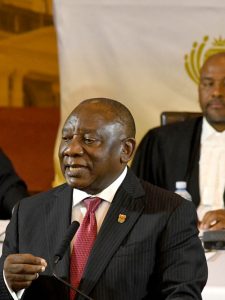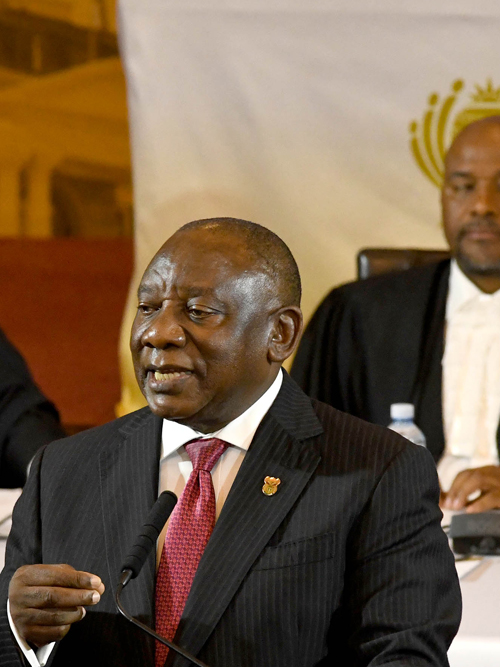In his recent State of the Nation Address (SoNA), President Cyril Ramaphosa commemorated not only the 30th year of South Africa’s democracy but also paid tribute to a dear friend and ally, the late President Hage Geingob of Namibia. President Geingob’s passing cast a shadow over the proceedings, reminding all present of the bonds of friendship and solidarity that exist across the continent.
The President’s address was imbued with a sense of reflection, looking back at the tumultuous journey South Africa has undertaken since the historic democratic elections of 1994. He evoked the emotions of that momentous day when millions of South Africans, many voting for the first time, cast their ballots with tears of joy and a profound sense of hope for the future.
President Ramaphosa eloquently described how that day represented the culmination of centuries of struggle against oppression, injustice, and inequality. It was a day when the dream of a free and united South Africa, as envisioned by Nelson Mandela, was translated into reality through the collective will of the people.
He reminded the nation of the profound symbolism of Nelson Mandela casting his vote in Inanda, KwaZulu-Natal, a place rich in historical significance for the struggle against apartheid. Mandela’s words on that day echoed a vision of hope, reconciliation, and nation-building that continues to inspire generations.
While celebrating the progress made over the past three decades, President Ramaphosa acknowledged the persistent challenges facing South Africa. From the global financial crisis to the recent Russia-Ukraine conflict, external factors have often hindered the country’s growth and development. Domestically, the scourge of state capture and the subsequent erosion of public trust in institutions have left deep scars on the fabric of society.
The President spoke candidly about the efforts to combat state capture, emphasizing the resilience of South Africans in defending their constitutional democracy. He praised the collective response to crises such as the COVID-19 pandemic, which tested the nation’s resolve but ultimately showcased its ability to unite in the face of adversity.
Addressing issues of gender-based violence and climate change, President Ramaphosa underscored the need for concerted action at both the governmental and societal levels. The commitment to ending gender-based violence and empowering women economically reflects a determination to build a more just and equitable society. Similarly, the President’s acknowledgment of the challenges posed by climate change signals a recognition of the urgent need for sustainable development practices.
President Cyril Ramaphosa’s State of the Nation Address was a poignant reminder of South Africa’s journey, marked by both triumphs and tribulations. It called upon all South Africans to reflect on the past, confront the present challenges, and collectively forge a path towards a more prosperous and inclusive future. As the nation stands at a crossroads, President Ramaphosa’s leadership offers a beacon of hope and resilience in navigating the complexities of the modern world.
The President’s address highlighted significant achievements and ongoing challenges facing South Africa as it marks 30 years of freedom. The government’s efforts to address unemployment, stimulate economic growth, combat corruption, and promote social justice were emphasized throughout the speech.
One of the key achievements mentioned was the creation of over one million school assistant positions in 23,000 schools, aimed at improving learning outcomes and providing valuable work experience. Additionally, initiatives like SAYouth.mobi and the Presidential Youth Employment Intervention have engaged millions of young people, offering opportunities for learning, earning, and entrepreneurship.
The President also underscored the administration’s commitment to eradicating corruption, dismantling criminal networks, and restoring trust in institutions. Significant progress has been made in prosecuting those involved in state capture, recovering stolen funds, and strengthening anti-corruption measures.
Economic reforms, infrastructure development, and investment promotion have been central to the government’s efforts to revive the economy and create jobs. Measures to stabilize the energy supply, expand renewable energy capacity, and modernize the mining sector were highlighted as key priorities.
Addressing social challenges, the government has implemented measures to improve access to education, healthcare, housing, and social assistance. Efforts to combat gender-based violence, promote gender equality, and empower marginalized communities were also emphasized.
Looking ahead, the President called for continued collaboration and commitment to building a more inclusive, prosperous, and democratic South Africa. He stressed the importance of defending constitutional rights, advancing social justice, and empowering future generations to realize the country’s full potential.
Overall, the President’s address reflected a balanced assessment of achievements and challenges, along with a vision for a more equitable and prosperous future for all South Africans.





